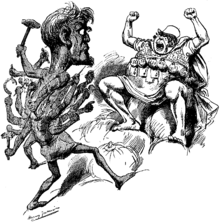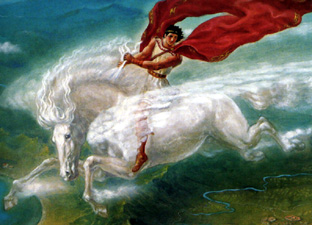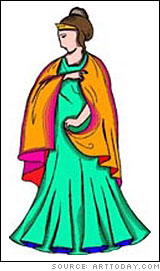THOR'S VISIT TO THE GIANTS
THOR'S VISIT TO THE GIANTS
[SIZE=-1]Nowadays, since their journey to get the stolen hammer, Thor and Loki were good friends, for Loki seemed to have turned over a new leaf and to be a very decent sort of fellow; but really he was the same sly rascal at heart, only biding his time for mischief. However, in this tale he behaves well enough.[/SIZE]
[SIZE=-1]It was a long time since Thor had slain any giants, and he was growing restless for an adventure. "Come, Loki," he said one day, "let us fare forth to Giant Land and see what news there is among the Big Folk."[/SIZE]
[SIZE=-1]Loki laughed, saying, "Let us go, Thor. I know I am safe with you;" which was a piece of flattery that happened to be true.[/SIZE]
[SIZE=-1]So they mounted the goat chariot as they had done so many times before and rumbled away out of Asgard. All day they rode; and when evening came they stopped at a little house on the edge of a forest, where lived a poor peasant with his wife, his son, and daughter.[/SIZE]
[SIZE=-1]"May we rest here for the night, friend?" asked Thor; and noting their poverty, he added, "We bring our own supper, and ask but a bed to sleep in." So the peasant was glad to have them stay. Then Thor, who knew what he was about, killed and cooked his two goats, and invited the family of peasants to sup with him and Loki; but when the meal was ended, he bade them carefully save all the bones and throw them into the goatskins which he had laid beside the hearth. Then Thor and Loki lay down to sleep.[/SIZE]
[SIZE=-1]In the morning, very early, before the rest were awake, Thor rose, and taking his hammer, Miölnir, went into the kitchen, where were the remains of his faithful goats. Now the magic hammer was skillful, not only to slay, but to restore, when Thor's hand wielded it. He touched with it the two heaps of skin and bones, and lo! up sprang the goats, alive and well, and as good as new. No, not quite as good as new. What was this? Thor roared with anger, for one of the goats was lame in one of his legs, and limped sorely. "Some one has meddled with the bones!" he cried. "Who has touched the bones that I bade be kept so carefully?"[/SIZE]
[SIZE=-1]Thialfi, the peasant's son, had broken one of the thigh-bones in order to get at the sweet marrow, and this Thor soon discovered by the lad's guilty face; then Thor was angry indeed. His knuckles grew white as he clenched the handle of Miölnir, ready to hurl it and destroy the whole unlucky house and family; but the peasant and the other three fell upon their knees, trembling with fear, and begged him to spare them. They offered him all that they owned,—they offered even to become his slaves,—if he would but spare their wretched lives.[/SIZE]
[SIZE=-1]They looked so miserable that Thor was sorry for them, and resolved at last to punish them only by taking away Thialfi, the son, and Röskva, the daughter, thenceforth to be his servants. And this was not so bad a bargain for Thor, for Thialfi was the swiftest of foot of any man in the whole world.[/SIZE]
[SIZE=-1]So he left the goats behind, and fared forth with his three attendants straight towards the east and Jotunheim. Thialfi carried Thor's wallet with their scanty store of food. They crossed the sea and came at last to a great forest, through which they tramped all day, until once more it was night; and now they must find a place in which all could sleep safely until morning. They wandered about here and there, looking for some sign of a dwelling, and at last they came to a big, queer-shaped house. Very queer indeed it was; for the door at one end was as broad as the house itself! They entered, and lay down to sleep; but at midnight Thor was wakened by a terrible noise. The ground shook under them like an earthquake, and the house trembled as if it would fall to pieces. Thor arose and called to his companions that there was danger about, and that they must be on guard. Groping in the dark, they found a long, narrow chamber on the right, where Loki and the two peasants hid trembling, while Thor guarded the doorway, hammer in hand. All night long the terrible noises continued, and Thor's attendants were frightened almost to death; but early in the morning Thor stole forth to find out what it all meant. And lo! close at hand in the forest lay an enormous giant, sound asleep and snoring loudly. Then Thor understood whence all their night's terror had proceeded, for the giant was so huge that his snoring shook even the trees of the forest, and made the mountains tremble. So much the better! Here at last was a giant for Thor to tackle. He buckled his belt of power more tightly to increase his strength, and laid hold of Miölnir to hurl it at the giant's forehead; but just at that moment the giant waked, rose slowly to his feet, and stood staring mildly at Thor. He did not seem a fierce giant, so Thor did not kill him at once. "Who are you?" asked Thor sturdily.[/SIZE]
[SIZE=-1]"I am the giant Skrymir, little fellow," answered the stranger, "and well I know who you are, Thor of Asgard. But what have you been doing with my glove?"[/SIZE]
[SIZE=-1]Then the giant stooped and picked up—what do you think?—the queer house in which Thor and his three companions had spent the night! Loki and the two others had run out of their chamber in affright when they felt it lifted; and their chamber was the thumb of the giant's glove. That was a giant indeed, and Thor felt sure that they must be well upon their way to Giant Land.[/SIZE]
[SIZE=-1]When Skrymir learned where they were going, he asked if he might not wend with them, and Thor said that he was willing. Now Skrymir untied his wallet and sat down under a tree to eat his breakfast, while Thor and his party chose another place, not far away, for their picnic. When all had finished, the giant said, "Let us put our provisions together in one bag, my friends, and I will carry it for you." This seemed fair enough, for Thor had so little food left that he was not afraid to risk losing it; so he agreed, and Skrymir tied all the provisions in his bag and strode on before them with enormous strides, so fast that even Thialfi could scarcely keep up with him.[/SIZE]
[SIZE=-1]The day passed, and late in the evening Skrymir halted under a great oak-tree, saying, "Let us rest here. I must have a nap, and you must have your dinner. Here is the wallet,—open it and help yourselves." Then he lay down on the moss, and was soon snoring lustily.[/SIZE]
[SIZE=-1]Thor tried to open the wallet, in vain; he could not loosen a single knot of the huge thongs that fastened it. He strained and tugged, growing angrier and redder after every useless attempt. This was too much; the giant was making him appear absurd before his servants. He seized his hammer, and bracing his feet with all his might, struck Skrymir a blow on his head. Skrymir stirred lazily, yawned, opened one eye, and asked whether a leaf had fallen on his forehead, and whether his companions had dined yet. Thor bit his lip with vexation, but he answered that they were ready for bed; so he and his three followers retired to rest under another oak.[/SIZE]
[SIZE=-1]But Thor did not sleep that night. He lay thinking how he had been put to shame, and how Loki had snickered at the sight of Thor's vain struggles with the giant's wallet, and he resolved that it should not happen again. At about midnight, once more he heard the giant's snore resounding like thunder through the forest. Thor arose, clenching Miölnir tight, and stole over to the tree where Skrymir slept; then with all his might he hurled the hammer and struck the giant on the crown of his head, so hard that the hammer sank deep into his skull. At this the giant awoke with a start, exclaiming, "What is that? Did an acorn fall on my head? What are you doing there, Thor?"[/SIZE]
[SIZE=-1]Thor stepped back quickly, answering that he had waked up, but that it was only midnight, so they might all sleep some hours longer. "If I can only give him one more blow before morning," he thought, "he will never see daylight again." So he lay watching until Skrymir had fallen asleep once more, which was near daybreak; then Thor arose as before, and going very softly to the giant's side, smote him on the temple so sore that the hammer sank into his skull up to the very handle. "Surely, he is killed now," thought Thor.[/SIZE]
[SIZE=-1]But Skrymir only raised himself on his elbow, stroked his chin, and said, "There are birds above me in the tree. Methinks that just now a feather fell upon my head. What, Thor! are you awake? I am afraid you slept but poorly this night. Come, now, it is high time to rise and make ready for the day. You are not far from our giant city,—Utgard we call it. Aha! I have heard you whispering together. You think that I am big ; but you will see fellows taller still when you come to Utgard. And now I have a piece of advice to give you. Do not pride yourselves overmuch upon your importance. The followers of Utgard's king think little of such manikins as you, and will not bear any nonsense, I assure you. Be advised; return homeward before it is too late. If you will go on, however, your way lies there to the eastward. Yonder is my path, over the mountains to the north."[/SIZE]
[SIZE=-1]So saying, Skrymir hoisted his wallet upon his shoulders, and turning back upon the path that led into the forest, left them staring after him and hoping that they might never see his big bulk again.[/SIZE]
[SIZE=-1]Thor and his companions journeyed on until noon, when they saw in the distance a great city, on a lofty plain. As they came nearer, they found the buildings so high that the travelers had to bend back their necks in order to see the tops. "This must be Utgard, the giant city," said Thor. And Utgard indeed it was. At the entrance was a great barred gate, locked so that no one might enter. It was useless to try to force a passage in; even Thor's great strength could not move it on its hinges. But it was a giant gate, and the bars were made to keep out other giants, with no thought of folk so small as these who now were bent upon finding entrance by one way or another. It was not dignified, and noble Thor disliked the idea. Yet it was their only way; so one by one they squeezed and wriggled between the bars, until they stood in a row inside. In front of them was a wonderful great hall with the door wide open. Thor and the three entered, and found themselves in the midst of a company of giants, the very hugest of their kind. At the end of the hall sat the king upon an enormous throne. Thor, who had been in giant companies ere now, went straight up to the throne and greeted the king with civil words. But the giant merely glanced at him with a disagreeable smile, and said,—[/SIZE]
[SIZE=-1]"It is wearying to ask travelers about their journey. Such little fellows as you four can scarcely have had any adventures worth mentioning. Stay, now! Do I guess aright? Is this manikin Thor of Asgard, or no? Ah, no! I have heard of Thor's might. You cannot really be he, unless you are taller than you seem, and stronger too. Let us see what feats you and your companions can perform to amuse us. No one is allowed here who cannot excel others in some way or another. What can you do best?"[/SIZE]
[SIZE=-1]At this word, Loki, who had entered last, spoke up readily: "There is one thing that I can do,—I can eat faster than any man." For Loki was famished with hunger, and thought he saw a way to win a good meal.[/SIZE]
[SIZE=-1]Then the king answered, "Truly, that is a noble accomplishment of yours, if you can prove your words true. Let us make the test." So he called forth from among his men Logi,—whose name means "fire,"—and bade him match his powers with the stranger.[/SIZE]
[SIZE=-1]Now a trough full of meat was set upon the floor, with Loki at one end of it and the giant Logi at the other. Each began to gobble the meat as fast as he could, and it was not a pretty sight to see them. Midway in the trough they met, and at first it would seem as if neither had beaten the other. Loki had indeed done wondrous well in eating the meat from the bones so fast; but Logi, the giant, had in the same time eaten not only meat but bones also, and had swallowed his half of the trough into the bargain. Loki was vanquished at his own game, and retired looking much ashamed and disgusted.[/SIZE]
[SIZE=-1]The king then pointed at Thialfi, and asked what that young man could best do. Thialfi answered that of all men he was the swiftest runner, and that he was not afraid to race with any one whom the king might select.[/SIZE]
[SIZE=-1]"That is a goodly craft," said the king, smiling; "but you must be a swift runner indeed if you can win a race from my Hugi. Let us go to the racing-ground."[/SIZE]
[SIZE=-1]They followed him out to the plain where Hugi, whose name means "thought," was ready to race with young Thialfi. In the first run Hugi came in so far ahead that when he reached the goal he turned about and went back to meet Thialfi. "You must do better than that, Thialfi, if you hope to win," said the king, laughing, "though I must allow that no one ever before came here who could run so fast as you."[/SIZE]
[SIZE=-1]They ran a second race; and this time when Hugi reached the goal there was a long bow-shot between him and Thialfi.[/SIZE]








